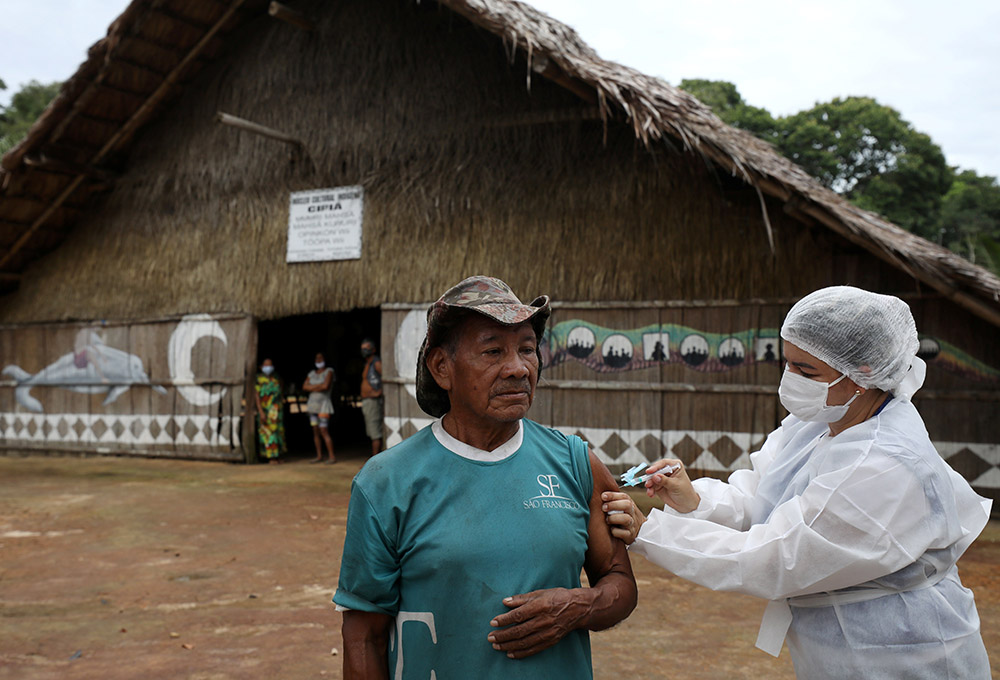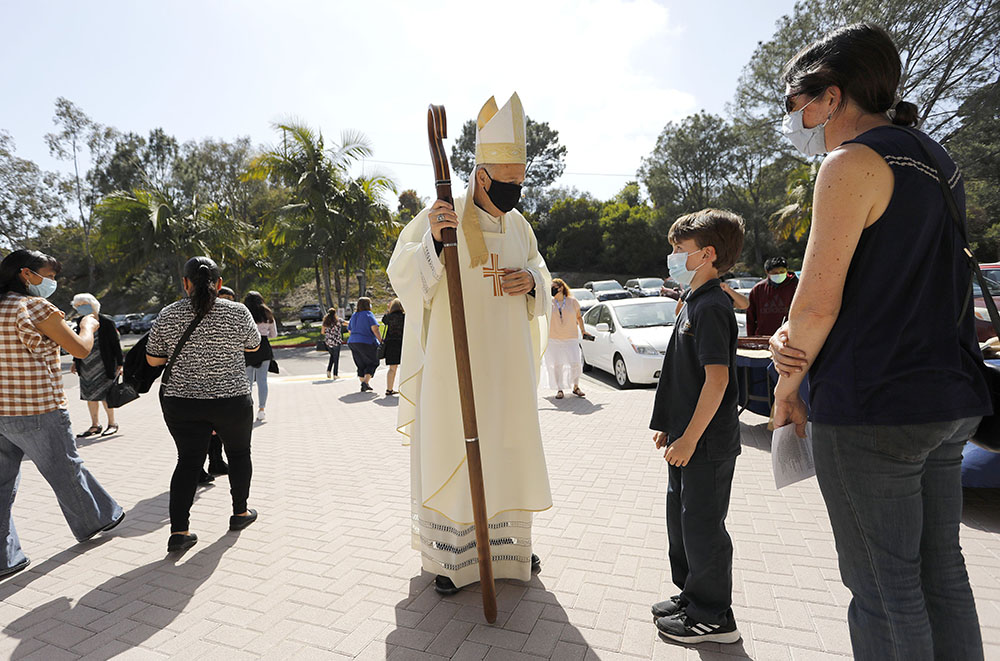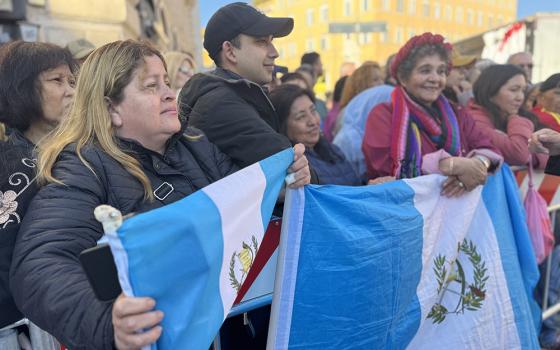
An Indigenous man receives the AstraZeneca/Oxford COVID-19 vaccine from a municipal health worker in the Sustainable Development Reserve of Tupe in Manaus, Brazil, Feb. 9. (CNS/Reuters/Bruno Kelly)
As U.S. President Joe Biden prepares to name his new ambassador to the Holy See, policy experts have encouraged the next Vatican ambassador to work closely with the Vatican's Dicastery for Promoting Integral Human Development.
San Diego's Bishop Robert McElroy, who was recently appointed by Pope Francis as one of five American board members to that Vatican office, says he "absolutely" agrees with that advice and believes one initial and significant area of potential collaboration would be vaccine distribution.
Equitable distribution of the COVID-19 vaccine has been a "tremendous concern" on the part of the dicastery, he noted, which is working with the scientific and medical communities to ensure that vaccine access is not limited to wealthy nations.
"That's an area which our country has to face," he told NCR. "Are we going to be vaccine hoarders? Or are we going to be like the good Samaritan in Fratelli Tutti who reaches out and really tries to even sacrifice ourselves?"
"I don't mean having our systems going without," he added. "I just mean in terms of taking initiative, spending some resources to help ensure that the science and the medical technology which has brought vaccines to our own people will move just as rapidly and enthusiastically and energetically, to bring vaccines to the people of the world, for their well-being and for our well-being. If I learned anything in this pandemic is these things are global."
"That's something where an ambassador could really be helpful because this is the government," McElroy encouraged. "It could help energize us policy much more vigorously, hopefully much earlier, if that kind of conversation and diplomacy with justice as its heart were at the root of it."

San Diego Bishop Robert McElroy greets parishioners at St. James Church in Solana Beach, California, April 17, after celebrating a bilingual Mass for Earth Week, observed April 16-25. (CNS/The Southern Cross/John Gastaldo)
'Rich and widespread tapestry of initiatives and outreach'
Vaccine distribution is just one of many concerns that fall to the dicastery, whose competencies include areas of migration, combating human trafficking, promoting peace and economic security, and the fight against climate change.
In his 2015 letter "Laudato Si', on Care for Our Common Home," Francis writes of these concerns and concludes, "Everything is interconnected." That encyclical now serves as the blueprint for the Vatican's dicastery tasked with promoting integral development.
"The dicastery has a very rich and widespread tapestry of initiatives and outreach," said McElroy, noting that he has been involved in a number of its initiatives in recent years, specifically on issues related to migration and questions of war and peace.
In 2016, Francis announced the formation of the new dicastery, which combined four different offices: the Pontifical Councils for Justice and Peace, for the Pastoral Care of Migrants and Itinerant People, for the Pastoral Assistance to Health Care Workers, and for human and Christian development, known as Cor Unum.
The new office, under the banner of integral human development, is led by Ghanaian Cardinal Peter Turkson.
Advertisement
"It's not a phrase that rolls off the tongue in terms of a dicastery name," said McElroy, "but it was purposefully chosen in that it really emphasizes that this cannot be simply one element of human rights or human well-being or the future of the world and creation. It can't be one element."
"They all need to be taken together, and you can't make progress on the economic front without respecting the environmental front," he said. "They're all related."
'Integral development' embodied in the Amazon synod
McElroy points to the October 2020 Synod of Bishops for the Pan-Amazon region, where he was a participant, as an example of how seeing the interconnectedness of issues offers a model for the church to move forward in addressing the multifaceted issues confronting both the church and the world.
"It took this region and the bishops of the region, some other bishops around the world, but also laywomen, religious women, priests and deacons, who came together and focused on that integral notion and what is required for integral human development in the Amazon," McElroy recalled.
He noted that the effects of climate change on the Amazon and its biodiversity is of "monumental importance for the whole global future," and that one accomplishment of the synod was to first listen to the local church and understand what was already being done in the region and then determine what sort of response was needed by the global church.
"It not only has to be holistic. It has to be faith-filled and it has to be a notion of conversion," said McElroy. "It's not simply a policy question to solve or a set of policy questions, no matter how important the policy questions. It's rather working to have a sense of balance, in which all peoples are taken into account, and the various issues are taken into account, but from a fundamentally integrated view of humanity."
He said that he was on a call earlier this month with both Brazilian church hierarchy and lay members who were "pressing home" to political leaders in both the United States and the Brazilian Congress "how important addressing climate change and economic injustice is for the indigenous people and the cultural destruction that's occurring there."
What was so significant, McElroy observed, was that the discussion was "not simply isolated policy," but that it took an integrated approach that offered a "full-bodied human dignity, especially for the indigenous people and for the regions of the Amazon."
US church leaders need to counter climate change deniers
As one of only three U.S. bishops who took part in the Amazon synod, McElroy told NCR that it was heartening to see how Catholic leaders from around the world see combating climate change as an urgent priority.

Young people gather for a climate change rally in New York City Sept. 20, 2019. (CNS/Gregory A. Shemitz)
Yet at home, the U.S. church's overall response to climate change has been criticized for lacking the necessary zeal to combat its major threats, and McElroy says he would like to see the U.S. church be more willing to "speak to the truth on climate change."
"It'd be very important for the church at all levels in the United States to begin making clear where the truth of science points us," he said, noting that it's time to push back against climate deniers. "The extractive industry has relied on a false, pseudo-science in the United States in the same way it was done with tobacco."
Francis is widely considered a world leader on issues related to environmental justice, and McElroy said the U.S. bishops should follow the leadership of the pope and the Dicastery for Promoting Integral Human Development, both of which have placed the issue front and center for the Catholic Church.
"It would be helpful at the [U.S. bishops'] conference to give a much more prominent place to the care of creation in its committee structures," he said.
McElroy, however, says that tackling climate change is not something that happens exclusively in hierarchical church structures, but also by standing with young people, many of them who already recognize the existential threats climate change poses to the planet.
The church, says McElroy, must "help parents see it through the eyes of their children."
"Not only because that's the prism that can touch a parent's heart but also, that's the prism which reveals that this is really for the next generations, and an incredibly powerful element of what their world will be like that we can help shape now."





